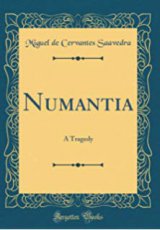The Siege of Numantia Page #13
The Siege of Numantia is a tragedy by Miguel de Cervantes set at the siege of Numantia. The play is divided into four acts. The dialogue is sometimes in tercets and sometimes in redondillas, but for the most part in octaves.
with them. The women carry certain figures of children in their arms, and some lead them by the hand, with the exception of LYRA, who carries none. See, how they come to make a fond appeal, That ye will leave them not in this sad case, And mean to soften down your hearts of steel. Within their arms they bear, with tearful face, Your tender sons; and to the loving breast They press them close, and give them last embrace. First Wife. Sweet lords of ours, if 'mid the woes increased Which shower their sorrows on Numantia's head-- Of which the mortal sufferings are the least-- Or in those better days which now are fled, We ever showed ourselves your spouses true, And ye our husbands kind and honourèd, Why, at this mournful time, when we may view The wrath of heaven poured out to our distress, Are all your proofs of love so scant and few? We long have known, what now your looks express, That on the Roman spears ye mean to bound; Because their cruelty affects you less Than that fell hunger-plague which rages round; From out whose lean and clutching hands, I say, No refuge nor escape can now be found. If so ye mean to die in open fray, And leave us here forsaken in these lands, To foul dishonour and to death a prey, Then first within our bosoms sheathe your brands; For this were better far in every wise, Than see us outraged in the foemen's hands. I am resolved, so far as in me lies, And fixed in this resolve I mean to dwell: To die at last where'er my husband dies. The same plain tale each one of us will tell, That not the fear of death, however great, Will keep her from the man who loves her well, In good or bad, in sweet or bitter fate. Another. Tell me, noble warriors, say, Have ye still the thought unkind Thus to leave us all behind, And go forward to the fray? Will ye leave, by any chance, These, Numantia's virgins pure, Keener anguish to endure From the Roman arrogance? And our sons, in freedom born, Will ye leave them to be slaves? Better far to find their graves In your arms, than bear this scorn. Will ye sate the Roman greed, Pander to the Roman lust, On our cherished rights and just Let their rank injustice feed? Shall our homes by villany Be despoiled of every treasure, And the Romans have the pleasure Of the weddings yet to be? Much and sorely have ye erred, Thousand ills will travel faster, If without a dog and master Thus ye leave the helpless herd. But if such a course ye try Bear us with you to the strife; Each will hold it as her life By her husband's side to die. Shorten not the road, I pray, Leading onward to the dead; Watchful hunger holds its thread, Which it lessens every day. Another._ Sons of mothers, sad in lot,[10] What is this? Where is your speech? Will ye not with tears beseech These your sires to leave you not? 'Tis enough that hunger fell With its pain should bring ye low; Why await a rougher blow From the Roman's hand as well? Tell them they begot you free, And in freedom were ye born; And your mothers, now forlorn, Brought ye up free men to be! Tell them, with unbated breath, All is over with the strife, And that they who gave you life Now are bound to give you death. Walls, that form our city's lines, If ye can, speak, I entreat, And with thousand tongues repeat: Liberty, ye Numantines! By our homes and sacred fanes, Reared in peace for happier lives, These your tender sons and wives Plead for pity in their pains! Soften down, ye warriors bold, These hard breasts, as well ye may, And like Numantines display Hearts as loving as of old! Not by breaking down the wall Will ye cure so great an ill; Fate as stern, and nearer still, Lies within for one and all. LYRA. All the tender maids as well Place their urgent case before ye, And for pity's sake implore ye All their rising fears to quell. Do not leave so rich a prey To the grasping hands ye see; Think what all these Romans be, Hungry wolves, and fierce are they. 'Tis an act most desperate Thus to sally from the town; Speedy death and wide renown-- That will be your certain fate. But suppose your chivalry Turn out better in the main, Is there any town in Spain Ready now to welcome ye? My poor wit may waste its breath, But the issue of this strife Will but give the foemen life, And to all Numantia death. At your gallant deed and rare, Think, the Romans will but mock; Can three thousand stand the shock Of the eighty thousand there? Though these walls be overpassed, Battered down, without a guard, Still the issue will be hard, Sorry vengeance, death at last. Better take the fate we have, Which the will of heaven gives; Be it safety for our lives, Or a summons to the grave. THEOGENES. Assuage your grief, and dry your tearful eyes, Ye tender wives, and let it now be known That we do feel your anguish in such wise, That love within our hearts hath overflown. Whether your pain to higher pitch shall rise, Or else be lessened by our kindly tone, We ne'er shall leave you now in life or death, But serve you truly to our latest breath. We thought, indeed, to sally from the town To meet with certain death, but not to fly; Though death it would not be, but live renown, To deal out glorious vengeance as we die. But since our plan is subject to your frown, And it were folly other plans to try, O sons beloved, and ye, our honoured wives, From this time forth we knit in one our lives. One thing alone is needful, that the foe Shall reap from us no triumph and no fame, Nay, rather shall he serve, in this our woe, As witness to immortalize our name. If now with me ye hand in hand will go, Through thousand ages shall your glory flame, For nothing in Numantia shall remain Which these proud foes can garner to their gain. Make now a fire in middle of the square, Whose tongues of flame shall to the heavens swell, And hurl therein our goods, without a care, The poorest and the richest things as well. This will ye judge a simple, light affair, When to your listening ears I have to tell
Translation
Translate and read this book in other languages:
Select another language:
- - Select -
- 简体中文 (Chinese - Simplified)
- 繁體中文 (Chinese - Traditional)
- Español (Spanish)
- Esperanto (Esperanto)
- 日本語 (Japanese)
- Português (Portuguese)
- Deutsch (German)
- العربية (Arabic)
- Français (French)
- Русский (Russian)
- ಕನ್ನಡ (Kannada)
- 한국어 (Korean)
- עברית (Hebrew)
- Gaeilge (Irish)
- Українська (Ukrainian)
- اردو (Urdu)
- Magyar (Hungarian)
- मानक हिन्दी (Hindi)
- Indonesia (Indonesian)
- Italiano (Italian)
- தமிழ் (Tamil)
- Türkçe (Turkish)
- తెలుగు (Telugu)
- ภาษาไทย (Thai)
- Tiếng Việt (Vietnamese)
- Čeština (Czech)
- Polski (Polish)
- Bahasa Indonesia (Indonesian)
- Românește (Romanian)
- Nederlands (Dutch)
- Ελληνικά (Greek)
- Latinum (Latin)
- Svenska (Swedish)
- Dansk (Danish)
- Suomi (Finnish)
- فارسی (Persian)
- ייִדיש (Yiddish)
- հայերեն (Armenian)
- Norsk (Norwegian)
- English (English)
Citation
Use the citation below to add this book to your bibliography:
Style:MLAChicagoAPA
"The Siege of Numantia Books." Literature.com. STANDS4 LLC, 2024. Web. 24 Nov. 2024. <https://www.literature.com/book/the_siege_of_numantia_60>.




Discuss this The Siege of Numantia book with the community:
Report Comment
We're doing our best to make sure our content is useful, accurate and safe.
If by any chance you spot an inappropriate comment while navigating through our website please use this form to let us know, and we'll take care of it shortly.
Attachment
You need to be logged in to favorite.
Log In